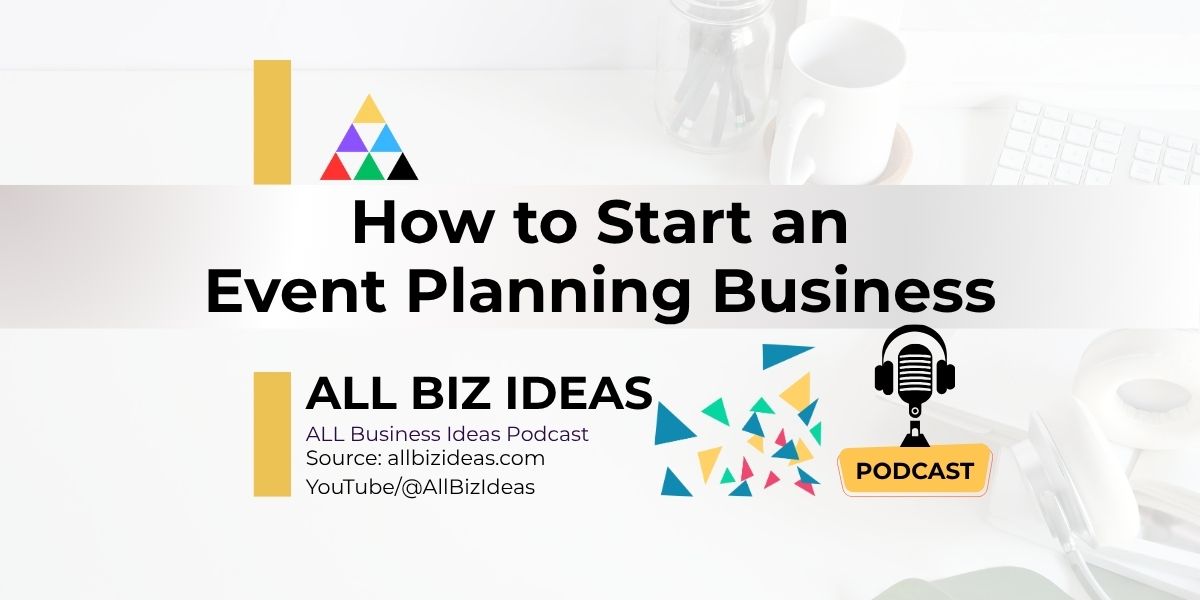How to Start an Event Planning Business | A Step-by-Step Guide to a Profitable Biz
In this guide, we’ll break down the steps on how to start an event planning business that is profitable and stands out in today’s competitive market.
Before jumping into the logistics of starting your business, it’s crucial to first understand the industry you’re entering. The event planning industry is diverse, with different niches such as weddings, corporate events, conferences, and social parties. As of 2025, the global event planning industry is projected to grow by 11.6% annually, making it a lucrative field.
Starting an event planning business can be an exciting and rewarding journey, especially in 2025, when the event planning industry is seeing consistent growth. Whether you’re passionate about organizing weddings, corporate events, or parties, event planning offers ample opportunities for creativity and profitability. Understanding your niche will not only help you focus your efforts but also set the stage for your marketing strategy.
Frequently Asked Questions
1. What makes the event planning industry a promising field to enter in 2025?
The event planning industry is projected to experience significant growth, with an annual increase of 11.6% by 2025. This consistent growth, coupled with the diverse range of niches like weddings, corporate events, conferences, and social parties, offers abundant opportunities for both creativity and profitability. Understanding and specializing in a particular niche can further enhance an event planner’s focus and marketing strategy.
2. What are the crucial initial steps to take before diving into the logistics of starting an event planning business?
Before focusing on logistics, it’s essential to understand the event planning industry and identify your specific niche. Researching the local market to determine high-demand event types and assessing competition can help define a profitable specialization. This early understanding will set the stage for your marketing efforts and ensure your services appeal to the right audience.
3. What key components should an event planning business plan include?
A robust business plan for an event planning venture should feature an executive summary outlining the business concept, mission, and unique selling proposition. It must also include thorough market research to understand demand, competition, and target clients. Additionally, it should detail the business structure, specific services offered with their pricing strategy, a marketing and sales plan, and a comprehensive financial plan covering startup costs, projected revenue, expenses, and a break-even analysis.
4. What essential skills and resources are necessary for a successful event planning business?
Key skills for event planners include exceptional organization, clear and concise communication, creativity for designing memorable experiences, strong problem-solving abilities to handle unexpected challenges, and effective budget management to maximize client resources.
Essential resources include a professional website and branding for online presence and credibility, event planning software (e.g., Eventbrite, Social Tables, Cvent) for efficient management, and a robust network of trusted vendors (florists, caterers, photographers) to ensure smooth execution.
5. What are the estimated startup costs for an event planning business?
On average, the total startup costs for an event planning business can range from $1,000 to $6,000. This estimate typically covers business registration and licensing ($100-$1,000), professional website development ($500-$3,000), annual software tools ($100-$500), initial marketing and advertising efforts ($200-$1,000), and essential equipment and supplies ($200-$500). The specific amount can vary based on investment in marketing, office space, and technology.
6. Who are the common target markets for event planning services?
Common target markets for event planners include couples planning weddings, which is a lucrative but competitive niche. Corporations often seek planners for conferences, meetings, and team-building activities, demanding strong logistical focus.
Nonprofits frequently hire planners for fundraising events, potentially with smaller budgets but consistent needs. Lastly, individuals planning social events and private parties like birthdays and anniversaries also present opportunities for event planners.
7. What effective marketing strategies should an event planning business utilize?
To attract clients, an event planning business should build a strong online presence through a visually appealing, SEO-optimized website that showcases portfolios and testimonials. Leveraging social media platforms like Instagram (for visual content), Facebook, and LinkedIn (for networking) is crucial. Word-of-mouth marketing and referrals from satisfied clients are invaluable, often incentivized through referral programs.
Collaborating and networking with other vendors (florists, caterers, photographers) can also provide valuable leads and cross-promotion opportunities.
8. What are some key strategies for ensuring long-term success in the event planning business?
Long-term success in event planning hinges on consistently providing an excellent client experience to secure repeat business and referrals. Staying highly organized using project management tools like Asana or Trello is vital for managing tasks, timelines, and communications.
Additionally, adapting to industry trends, such as sustainable planning, virtual events, or new technologies, is essential to keep the business relevant and competitive.
As you explore how to start an event planning business, it’s essential to understand what’s involved in creating a business plan, acquiring the right resources, and finding the target market that suits your skills. From understanding the basics to marketing your services, we’ll cover it all, giving you the knowledge you need to thrive in the event planning industry.
Pro Tip: How to start an event planning business? Research local competition to identify gaps in the market. For example, if there’s a shortage of planners specializing in eco-friendly businesses events in your area, this could be a profitable niche to explore.
Step 1: Understanding the Event Planning Industry
Before diving into the logistics of how to start an event planning business, it’s crucial to understand the landscape of the event planning industry in 2025. The event planning market is projected to grow significantly over the next few years, offering abundant opportunities for anyone with a keen eye for detail and creativity.
The first thing you need to do when learning how to start an event planning business is decide on a niche. Event planning covers various types of events such as weddings, corporate events, parties, and conferences. Each has its own unique requirements and client expectations. For example, wedding planning often demands high attention to detail, creativity, and vendor coordination, while corporate event planning may require a stronger focus on logistics, branding, and client relationships.
Pro Tip: Start by researching your local market. Find out which types of events are in high demand in your area and assess your competition. This research will help you define your small business ideas niche and give you the edge in how to start an event planning business that appeals to the right audience.
Step 2: Develop Your Event Planning Business Plan
A solid business plan is the foundation of any successful business. It’s your roadmap for the next few years and helps you stay focused on your goals. A business plan also serves as a tool when seeking investment or financing.
How to start an event planning business? Here’s what should be included in your event planning business plan:
- Executive Summary
- A brief overview of your business concept, including your mission and vision.
- What services will you offer? (e.g., wedding planning, corporate events, venue management, etc.)
- What is your unique selling proposition (USP)? What sets you apart from other event planners?
- Market Research
- Understand the demand for your services and the competitive landscape.
- Who are your potential clients? Are they couples planning weddings, companies hosting conferences, or individuals planning parties?
- What are the pricing trends in your local market? How much do competitors charge for similar services?
- Business Structure
- Are you going to run your business as a sole proprietorship, partnership, or LLC? Consider the legal structure that fits your goals.
- This section should also outline any legal requirements for operating in your area (licenses, permits, insurance, etc.).
- Services and Pricing
- Detail the event planning services you’ll offer. Will you provide full-service planning or specialize in certain aspects (e.g., catering, decor, venue selection)?
- Include a pricing strategy. Will you charge hourly, by the event, or offer packages?
- Marketing and Sales Strategy
- How will you attract clients? We’ll dive into marketing strategies later, but this section should include a brief overview of your target market and sales approach.
- Financial Plan
- Estimate your startup costs (we’ll discuss this in more detail below).
- Project your revenue streams and expenses for the first few years.
- Break-even analysis: When do you expect your business to become profitable?
Step 3: Identify the Necessary Skills and Resources for How to Start an Event Planning Business
Starting an event planning business isn’t just about passion; it’s about having the right resources and skills to execute your vision. Here’s a closer look at the resources and skills you’ll need as you figure out how to start an event planning business.
Essential Resources:
- Office Space:
- Initially, you can work from home to minimize expenses. However, as your business grows, you may want to invest in a small office or coworking space to meet with clients.
- Website & Branding:
- In today’s digital age, a professional website is non-negotiable. Your website should serve as a portfolio for potential clients to view your past work, understand your services, and contact you. It’s essential for SEO purposes and to establish your credibility.
- Event Planning Software:
- Invest in event planning software like Eventbrite, Social Tables, or Cvent. These tools can help you manage guest lists, coordinate schedules, and even sell tickets for events.
- Vendor Network:
- Build relationships with trusted vendors like florists, caterers, photographers, and. venues. Having a reliable network will streamline event planning and ensure sell smooth execution.
Key Skills Needed:
- Organization:
- As an event planner, you’ll be managing multiple tasks simultaneously. From booking vendors to confirming timelines, organization is key to staying on top of everything.
- Communication:
- You’ll be in constant contact with clients, vendors, and event attendees. Clear, concise communication ensures everything runs smoothly and that everyone involved is on the same page.
- Creativity:
- Event planning requires a creative mind. Whether it’s designing an event’s theme or coming up with innovative ways to surprise guests, creativity will help you offer memorable experiences.
- Problem-Solving:
- Events are full of unpredictable challenges. Whether it’s a last-minute change in the guest list or a vendor issue, being able to quickly solve problems will set you apart from competitors.
- Budget Management:
- Understanding how to work within a budget is crucial. Most clients will have a set budget, and your ability to maximize that budget while delivering a fantastic event will help you gain client trust and referrals.
Step 4: Event Planning Business Estimate Startup Costs
Now that you know how to start an event planning business with the skills and resources required to start an event planning business, let’s look at the startup costs involved. Knowing these costs will help you understand how to start an event planning business and what your initial investments will be.
- Business Registration and Licensing:
- The costs for registering your business depend on your location. Expect to pay anywhere from $100 to $1,000 for registration, permits, and business licenses.
- Website Development:
- A professionally designed website is a must. You can expect to pay anywhere from $500 to $3,000 for a website that is SEO-optimized, user-friendly, and mobile-responsive.
- Software Tools:
- Event planning software can cost between $100 and $500 per year. Additionally, you may want to invest in tools for communication (like Slack or Zoom) and project management (like Trello).
- Marketing and Advertising:
- Marketing is crucial for attracting clients. Budget for social media ads, print materials, and content marketing. Typically, your marketing budget will range from $200 to $1,000 in the first year.
- Equipment & Supplies:
- As an event planner, you might need office supplies, business cards, or event-related materials (such as signage). This can cost around $200 to $500.
Total Startup Costs:
- On average, you can expect to spend $1,000 to $6,000 to start an event planning business. This can vary depending on how much you invest in marketing, office space, and technology.
Step 5: Identify Your Event Planning Business Target Market
When you’re figuring out how to start an event planning business, one of the first things to do is identify your target market. This will help you focus your marketing efforts and service offerings. Some of the most common target markets for event planners include:
- Couples (Weddings):
- Wedding planning is one of the most profitable niches within event planning. Brides and grooms often spend a significant portion of their budget on a wedding planner, so this market is lucrative but competitive.
- Corporations:
- Corporate events such as conferences, meetings, team-building activities, and trade shows are in high demand. Businesses often need planners to help with logistics and execution.
- Nonprofits:
- Charities and nonprofit organizations frequently host fundraising events. These clients may have smaller budgets, but they often need the expertise of professional planners to ensure the success of their events.
- Social Events and Private Parties:
- Birthday parties, anniversaries, and holiday gatherings provide another niche for event planners. These types of events may not have as large a budget as corporate clients but can still offer great opportunities.
Step 6: Marketing Your Event Planning Business
Marketing is essential to growing your business. Here are a few proven strategies:
- Build an Online Presence:
- Website: Your website should be visually appealing, easy to navigate, and mobile-friendly. It should also feature testimonials, case studies, and an easy way for potential clients to reach out.
- SEO: Use SEO strategies to optimize your website for search engines. Write blogs or guides (like this one) on topics such as “how to plan a wedding” or “corporate event planning tips.” This will help you rank higher in Google search results.
- Social Media:
- Instagram is a goldmine for event planners, as it’s a highly visual platform. Share photos of past events, behind-the-scenes shots, and customer testimonials.
- Facebook and LinkedIn are great for networking, especially for corporate events.
- Word of Mouth and Referrals:
- Happy clients are your best marketing tool. Ask satisfied customers for referrals and reviews. Consider creating a referral program to incentivize word-of-mouth marketing.
- Collaborate with Vendors:
- Network with vendors and other event planners. Cross-promote each other’s services to widen your reach.
- Develop relationships with vendors such as florists, caterers, and photographers. Networking can provide valuable leads and referrals.
Step 7: Event Planning Business Strategies for Success
Finally, when learning how to start an event planning business, here are a few strategies to ensure long-term success:
- Focus on Client Experience:
- Providing excellent service and ensuring a seamless client experience is vital to gaining repeat business and referrals.
- Stay Organized:
- Use project management tools like Asana, Google Calendar, or Trello to keep track of client requirements, timelines, tasks, and communications.
- Adapt to Trends:
- Keep an eye on industry trends, whether it’s sustainable event planning, virtual events, or new event technologies. Staying ahead of trends keeps your business relevant.
Conclusion
Learning how to start an event planning business is an exciting venture that can lead to personal fulfillment and financial success.
Starting an event planning business can be both exciting and profitable. By following this step-by-step guide—crafting a solid business plan, gathering the necessary resources, targeting the right market, and marketing effectively—you’ll set yourself up for long-term success.
With the right tools, mindset, and passion, your event planning business can become the go-to resource for creating memorable, successful events.
Stay organized, stay focused, and always deliver exceptional service. Your event planning business is ready to thrive!



